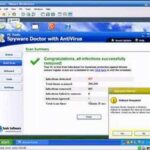
1. Understanding the Basics of Spyware
🔍 1. Understanding the Basics of Spyware 🔍
Spyware is a type of malicious software that is designed to secretly monitor and gather information from a computer or device without the user’s knowledge or consent. It can infiltrate your system through various means, such as downloading infected files, opening suspicious email attachments, or visiting compromised websites. Understanding the basics of spyware is crucial in protecting yourself and your sensitive information from potential threats.
🔎 How does spyware work? 🔎
Once installed on your device, spyware operates silently in the background, collecting information about your online activities, such as websites visited, passwords entered, and personal data like social security numbers or credit card information. This data can be used for various malicious purposes, including identity theft, unauthorized access to financial accounts, and targeted advertising.
🛡️ Protecting yourself against spyware 🛡️
To safeguard your devices from spyware, it is essential to follow some best practices. Keeping your operating system and security software up to date plays a crucial role in preventing spyware infections. Additionally, exercise caution when downloading files or clicking on links, especially from unknown or untrusted sources. It is also advisable to enable firewall protection, regularly scan your system for malware, and use strong, unique passwords for all your online accounts.
💡 Recognizing signs of a spyware infection 💡
Being familiar with the common signs of a spyware infection can help you take immediate action and prevent further damage. Some indicators include a sluggish device performance, unexpected browser toolbars or homepage changes, frequent pop-up ads, or unauthorized access to personal accounts. If you suspect your device has been infected, it is crucial to run a reputable antivirus scan promptly to detect and remove any spyware.
In conclusion, understanding the basics of spyware is essential in today’s digital age. By knowing how spyware operates, taking preventive measures, and recognizing signs of a potential infection, you can effectively protect your personal information and maintain a secure online presence. Stay vigilant and stay safe!
2. Installing Reliable Anti-Spyware Software
😊 In today’s digital age, protecting our computers and personal information is of utmost importance. One of the key steps to ensure our online safety is to install reliable anti-spyware software. With the rise of cyber threats and the ever-evolving techniques used by hackers, having a robust defense system is essential. In this article, we will explore the benefits of installing anti-spyware software and how it can enhance your overall cybersecurity.
🔒 Installing anti-spyware software acts as a shield against malicious programs that may invade your computer and compromise your privacy. Spyware, as the name suggests, is designed to spy on your online activities, collect sensitive information, and even control your device remotely. With a reliable anti-spyware program, you can detect and remove these threats, ensuring your data remains secure and personal details remain confidential.
💻 It is essential to choose a reputable anti-spyware software that offers real-time scanning and updates. By continuously scanning your system for any potential threats, the software can detect and mitigate spyware before it causes any harm. Regular updates are also crucial to stay ahead of the latest spyware variants and safeguard against newly discovered vulnerabilities.
🚀 Installing anti-spyware software not only protects your personal information but also enhances your computer’s overall performance. Spyware programs often run in the background, consuming valuable system resources, and slowing down your device. By blocking these intrusive programs, anti-spyware software helps optimize your computer’s speed and ensures smooth and efficient operation.
📅 It is recommended to schedule regular scans with your anti-spyware software to identify and eliminate any potential threats that may bypass the real-time protection. Just like regular health check-ups, these scans help keep your computer healthy and secure. Make sure to configure your software to automatically update and scan your system, reducing the risk of infections.
By following these simple steps and installing reliable anti-spyware software, you can significantly enhance your computer’s security and protect your personal information from prying eyes. Take the time to research and choose a reputable software that fits your needs, and keep your defense system up to date to stay one step ahead of cyber threats. Remember, prevention is always better than cure when it comes to online security! 😉
- 🔎💼 Discover How Spyware is Used by Employers: Stay Informed!
- 🔎📚 ¡Descubre cómo protegerte de spyware PDF y mantener tu información segura!
- 🔍 ¿Por qué se llama Spyware? Descubre el origen y significado de este término 🕵️♂️
- 👀🔍 ¡Descubre dónde ver spyware! Guía para identificar y proteger tus dispositivos 👀🔒
- 🔍 ¿Qué Spyware Tengo? Descubre cómo Identificarlo y Proteger tu Equipo 📲
3. Practicing Safe Browsing Habits
🔒 Practicando hábitos de navegación segura 🔒
En este mundo digital en el que vivimos, cada vez estamos más expuestos a amenazas cibernéticas. La seguridad en línea se ha vuelto más importante que nunca, y es crucial tomar medidas para protegernos mientras navegamos por internet. Aquí te presento algunos consejos para practicar hábitos de navegación segura y proteger tus datos y privacidad.
1️⃣ Mantén tus dispositivos actualizados: Los fabricantes de software lanzan actualizaciones constantemente para corregir errores y vulnerabilidades. Asegúrate de mantener tu sistema operativo, navegadores web y aplicaciones siempre actualizados para tener la última protección contra amenazas en línea.
2️⃣ Utiliza contraseñas fuertes: Una contraseña segura es tu primera línea de defensa contra los ciberdelincuentes. Asegúrate de utilizar contraseñas largas y complejas, que incluyan una combinación de letras, números y caracteres especiales. Evita utilizar contraseñas comunes o información personal fácil de adivinar.
3️⃣ Ten cuidado al hacer clic: Antes de hacer clic en enlaces o descargar archivos, asegúrate de que provengan de fuentes confiables. Evita hacer clic en enlaces sospechosos o abrir archivos adjuntos de correos electrónicos desconocidos, ya que pueden contener malware o virus.
4️⃣ Utiliza una red privada virtual (VPN): Una VPN te ayuda a proteger tu conexión a internet y enmascarar tu dirección IP. Esto te permite navegar de forma segura y anónima, incluso en redes Wi-Fi públicas. Asegúrate de elegir una VPN confiable y utilizarla cuando te conectes a internet.
Recuerda, practicar hábitos de navegación segura no solo te brinda tranquilidad, sino también te protege de posibles amenazas. Sigue estos consejos y mantén tus dispositivos y datos protegidos mientras disfrutas de todo lo que internet tiene para ofrecer. ¡Navega seguro!
4. Performing Regular System Scans
🔍 Regular system scans are an essential part of maintaining the security and stability of your computer or network. By performing these scans on a consistent basis, you can identify and address any potential vulnerabilities or malware threats that may be present.
🔍 One of the most effective ways to conduct regular system scans is through the use of antivirus software. These programs are designed to detect and remove malicious software such as viruses, Trojans, and worms that can compromise your system’s performance and expose your sensitive information.
🔍 Another important aspect of performing regular system scans is updating your operating system and software. Software updates often include security patches and bug fixes that can help protect your system from known vulnerabilities. By regularly checking for updates and installing them, you can ensure that your system is equipped with the latest protection.
🔍 It is also crucial to scan your system regularly for any signs of unauthorized access or suspicious activities. This includes monitoring your network for any unusual traffic or unauthorized connections. By being proactive in detecting potential security breaches, you can take immediate action to prevent any further damage to your system.
🔍 In addition to antivirus software and regular updates, it is recommended to perform deep scans of your system. These scans thoroughly examine all files and folders, including hidden ones, to identify any hidden malware or suspicious files that may have evaded detection during regular scans.
🔍 Lastly, it is important to establish a regular schedule for system scans. This helps ensure that the scans are consistently performed and that any potential threats are promptly identified and addressed. By setting aside dedicated time for system scans, you can prioritize the security of your computer or network and ensure its continuous protection.
Conclusion
Scanning your system on a regular basis is an essential practice for maintaining the security and stability of your computer or network. By utilizing antivirus software, keeping your operating system and software up to date, monitoring for unauthorized access, performing deep scans, and establishing a regular scanning schedule, you can effectively detect and address any potential security threats. Prioritizing regular system scans will enable you to stay one step ahead of cyber threats and safeguard your valuable data and information.
5. Keeping Your Software Up to Date
Keeping your software up to date is crucial for ensuring the security and functionality of your devices. 🔄 By regularly updating your software, you can protect your system from potential vulnerabilities and stay ahead of cyber threats. It may seem like a simple task, but neglecting to update your software can lead to serious consequences.
One of the main reasons to keep your software up to date is to patch any security vulnerabilities that may have been discovered. 🔒 Developers are constantly improving their software to address any loopholes that hackers may exploit. By staying updated, you can benefit from these patches and strengthen your overall security.
In addition to security, software updates often offer new features, improved user experience, and enhanced performance. 🚀 Developers constantly work on optimizing their software to provide a better user experience. By keeping your software up to date, you can take advantage of these improvements and make the most of your devices.
Outdated software can also slow down your devices and lead to crashes and glitches. ⏳ Developers release updates to fix bugs and optimize their software for better performance. By regularly updating your software, you can ensure that your devices run smoothly and efficiently.
Ignoring software updates can also cause compatibility issues with other programs and devices. 🔄 As technology evolves, so do software requirements and protocols. By not updating your software, you may find it difficult to integrate with other devices or use certain programs that rely on updated versions.
Lastly, keeping your software up to date is not just important for individual users, but also for businesses. 💼 Outdated software can leave your company vulnerable to security breaches and put sensitive data at risk. By implementing a software update policy, you can ensure that your business remains secure and productive.
In conclusion, keeping your software up to date is vital for both personal and business users. By regularly updating your software, you can enhance security, enjoy new features, improve performance, prevent compatibility issues, and safeguard sensitive data. So, don’t ignore those software update notifications – they are there for a reason!
 🔍🔒 ¡Encuentra y protege tu dispositivo! Spyware Detector: la herramienta definitiva para mantener tu información segura
🔍🔒 ¡Encuentra y protege tu dispositivo! Spyware Detector: la herramienta definitiva para mantener tu información segura 🔍💻 ¡Detecta y elimina tu spyware con Spyware Doctor! Guía completa del mejor software antiespías 💪🔒
🔍💻 ¡Detecta y elimina tu spyware con Spyware Doctor! Guía completa del mejor software antiespías 💪🔒 🔎 Cómo detectar spyware: Consejos y herramientas para proteger tu dispositivo 💻🔒
🔎 Cómo detectar spyware: Consejos y herramientas para proteger tu dispositivo 💻🔒 🔍 ¡Descarga el mejor detector de spyware! Spyware Detector Pro APK 📲
🔍 ¡Descarga el mejor detector de spyware! Spyware Detector Pro APK 📲 🔎 Encuentra y elimina el spyware con Spyware Finder: ¡Protege tu dispositivo ahora!
🔎 Encuentra y elimina el spyware con Spyware Finder: ¡Protege tu dispositivo ahora! 🔍🛡️ ¡Descubre el mejor programa para detectar malware y spyware! Protege tu equipo ahora mismo 🔒💻
🔍🛡️ ¡Descubre el mejor programa para detectar malware y spyware! Protege tu equipo ahora mismo 🔒💻